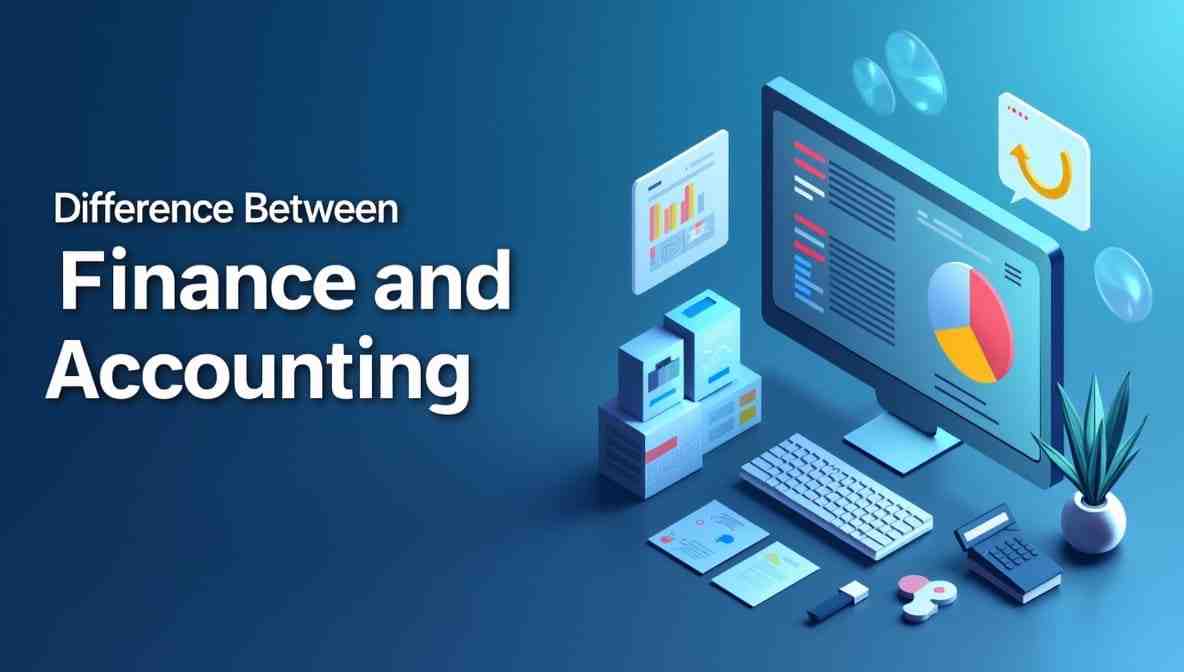When handling money in a company or even a family, understanding finance and accounting is key. Though people often mix them up, they have clear differences. Accounting tracks the flow of money, ensuring accurate records of assets and liabilities. On the other hand, finance has a broad scope, covering how one manages financial decisions, investments, and risks. Whether for a department or an entire organization, both disciplines play a role in maintaining financial health.
If you are considering a career in this field, knowing these differences is crucial. Businesses hire specialists to help with evaluating and strategizing financial plans. With the right knowledge, you can make informed decisions about your finances or even seek a financial advisor through services like SmartAsset’s matching tool. Whether working in administration, management, or a dedicated accounting role, knowing how these areas work together ensures a strong foundation for financial success.
What Is Finance?
Finance is essential in both personal and business settings, as it helps in handling money wisely. It involves various activities such as investing, borrowing, lending, budgeting, and forecasting to ensure that funds are used effectively. Whether for an organization or an individual, proper financial management is necessary for stability and growth. A well-structured financial strategy helps in making informed decisions regarding purchasing, saving, and future investments.
The field of finance is quite broad, covering different types such as personal finance, corporate finance, and public finance. Each of these categories has its own nuances and follows specific regulations and policies. For instance, personal finance focuses on planning for retirement, mortgages, and handling banking needs. Corporate finance, on the other hand, deals with running a business, forming investment strategy, and managing capital efficiently. Public finance refers to how the government allocates resources, manages spending, and collects tax to support public services.
Financial concepts and principles play a key role in decision-making. The idea of time value and intrinsic value of money is rooted in microeconomic and macroeconomic theory. Understanding these principles helps businesses and individuals maximize their wealth and minimize risks. According to Investopedia, the finance industry is divided into sub-categories, which include different aspects of financial management.
Proper financial planning ensures that individuals and businesses can achieve long-term stability. Whether it is acquiring necessary funds for investments or making informed choices regarding financial products, financial literacy is essential. From managing resources to handling concerns related to economic changes, finance influences every aspect of life.
In today’s world, financial decisions shape the success of businesses and individuals alike. Understanding financial regulations, industry trends, and economic factors helps in navigating challenges. Whether managing a personal budget or overseeing a company’s financial health, applying the right financial strategies can make a significant difference.
What Is Accounting?
Accounting is the process of recording, reporting, and communicating financial information about a business, organization, or individual. It provides a clear snapshot of an entity’s position at a given time, helping in making strategic decisions. Unlike finance, which focuses on planning and investments, accounting ensures that every financial transaction is properly documented and categorized. This practice forms the foundation for accurate financial statements, including income statements, balance sheets, and cash flow statements.
The activities involved in accounting include collecting and compiling financial data, analyzing and summarizing performance, and preparing reports that reflect an organization’s financial health. There are two main segments of accounting: managerial accounting and financial accounting. While managerial accounting focuses on internal processes and helps management make informed business choices, financial accounting deals with aggregating financial data for external parties, such as investors, creditors, and taxing authorities.
One key difference between these two types of accounting is in their presentation and purpose. Managerial accounting helps businesses with forecasting, budgeting, and operational analysis, whereas financial accounting ensures compliance with industry regulations and creates reports for stakeholders. According to Investopedia, accounting also includes specific specialties, such as cost accounting, which determines the cost of producing a product and helps businesses decide on pricing strategies.
Accounting plays a vital function in any business by measuring economic results and processing financial data into meaningful insights. Companies rely on accountants to ensure transparency and accuracy in financial measures, which helps decision-makers plan for future growth. Without proper accounting, businesses would struggle to track their finances, maintain records, or comply with regulatory requirements.
Whether it is ensuring smooth financial processes or managing reports for external parties, accounting remains a crucial aspect of any financial system. A strong understanding of accounting not only improves business fluency but also helps organizations remain financially stable and compliant with industry standards.
Finance vs. Accounting: The Basics
The difference between finance and accounting lies in their focuses and purpose. While accounting is concerned with the day-to-day flow of money in and out of a company or institution, finance takes a broader approach, dealing with the management of assets and liabilities, as well as the planning of a future financial roadmap. Both fields are crucial, but they serve different functions in an organization’s operations.
If you want to oversee high-level financial control and drive a company’s strategy, then finance is the right path for you. On the other hand, if you prefer working with specific financial records and ensuring accuracy in a company’s books, then accounting would be a better fit. A common distinction is that accounting looks at the past financial transactions, while finance looks forward, focusing on the acquisition and growth of assets.
Those interested in studying accounting will take classes on practices, ethics, business, and law, including tax law and theory. In contrast, students pursuing finance will delve into macroeconomics, international markets, financial engineering, and corporate finance. These subjects help develop the skills needed to make sound financial decisions and understand global economic trends.
Both finance and accounting offer rewarding career paths, each playing a key role in the financial health of a business. Whether managing financial growth or ensuring compliance with financial regulations, both fields require expertise and analytical skills. Knowing which path aligns with your strengths and interests can help you make an informed career choice.
Finance vs. Accounting: Career Options:
Choosing between a career in finance or accounting depends on your skills and interests. If you are curious about how money moves within a company or want to ensure financial compliance, a job in accounting might be a good fit. On the other hand, if you are more interested in planning for financial growth and making strategic decisions, a career in finance could be more suited for you.
In accounting, professionals focus on tracking and reporting flows of money, ensuring adherence to best practices and regulations. They follow Generally Accepted Accounting Principles (GAAP) and may work with the tax code outlined in the Internal Revenue Code, specifically Section 446, which governs methods of accounting. Common job titles in this field include controller, tax manager, fund accountant, valuation analyst, and financial reporting accountant. Some may also work as tax accountants, bookkeepers, treasurers, or auditors within businesses, nonprofit organizations, or the government.
A finance career, however, offers a broader range of opportunities. Many professionals work in corporate finance, consulting, or banking. They might become financial analysts, investment bankers, or financial examiners. Some pursue roles as personal financial advisors or money managers, helping clients manage their finances. The field also extends to insurance underwriting and entrepreneurship, making it attractive to those who enjoy strategic decision-making and risk management.
For those deciding between the two, it’s important to consider their long-term path. Studying finance or accounting in college allows students to explore different majors and determine which field aligns with their interests. While both fields require strong analytical skills, finance tends to focus more on forward-thinking strategies, whereas accounting deals with historical financial records.
Additionally, financial professionals often report to a Chief Financial Officer (CFO) in larger organizations, while accountants ensure regulatory compliance and accurate record-keeping. Both fields play essential roles in a company’s success, making them equally valuable career choices.
Whether you prefer working with numbers in structured accounting roles or making high-level financial distinctions in finance, both paths offer promising opportunities for growth and specialization.
Finance vs. Accounting: Salaries
When choosing a career in finance or accounting, one important factor to consider is salary. Both fields offer various earning potentials based on job roles and experience. The Bureau of Labor Statistics (BLS) projects strong growth prospects for both professions by 2024, though salaries vary significantly depending on the position.
A financial analyst, for example, had a median pay of around $100,000 per year in 2023, which translates to $48 per hour. The BLS predicts that between 2023 and 2033, the number of jobs for financial analysts will grow by 9%, which is considered a faster-than-average rate compared to other occupations.
For those in accounting, the earning potential is slightly lower but still promising. Accountants and auditors earned a median pay of $80,000 per year or $38 per hour in 2023. The demand for these jobs is expected to increase by 6% between 2023 and 2033, reflecting an above-average growth rate.
However, not all positions in accounting offer high salaries. Bookkeeping, clerks, and auditing roles had a median pay of $47,440 per year or $22.81 per hour in 2023. Unlike other roles in finance and accounting, these positions are projected to decline by 5% over the next decade. This highlights the difference in high-salary, high-growth roles versus lower-salary, negative-growth positions within the industry.
On the other hand, not all jobs in finance guarantee high earnings. Some fundraising professionals, for instance, had a median pay of $64,160 per year or $30.85 per hour in 2023. However, the job outlook remains strong, with an expected 6% growth rate between 2023 and 2033, still considered above average.
Overall, salaries in finance and accounting depend on the job title and industry demand. While some positions offer lucrative pay and high-growth opportunities, others may have slower growth or even decline over time. Choosing the right path depends on one’s career goals and willingness to adapt to industry trends.
Key Differences Between Finance and Accounting:
Both finance and accounting play essential roles in managing money, but they focus on different aspects of an organization’s financial situation. While accounting provides a snapshot of past and present transactional data, finance is more forward-looking, analyzing the value of assets and predicting the future financial health of a company.
In accounting, professionals use the accounting equation—Assets = Liabilities + Owners’ Equity—to understand how much a company owns and owes. This formula helps determine the balance between a firm’s assets and its claims from shareholders. Keeping accurate financial records over a period of time is a fundamental part of accounting, ensuring transactions are properly tracked and reported.
A major method used in accounting is the accrual method, where transactions are recorded when they are agreed upon, rather than when they are completed. This allows companies to manage credit, handle deferred payments, and compare revenues and costs over time. It also helps businesses smooth out financial data to better depict economic reality, making it easier to track year-on-year growth, profits, and changes caused by seasonal or cyclical trends.
On the other hand, finance rejects this approach and instead measures economic returns based on actual cash flow. It focuses on how a company produces and leverages cash, considering only when money is exchanged, rather than just when agreements are made. This method provides a clearer picture of a company’s ability to generate real cash.
Another key difference between the two disciplines is how they approach value. In accounting, the conservatism principle requires companies to record their assets at a lower estimated value and their liabilities at a higher amount. This doctrine ensures financial statements do not overestimate gains. In fact, if the precise worth of an asset cannot be determined, accountants may count it as zero to avoid overextending financial expectations.
In finance, however, valuation takes a more analytical approach. The gold standard for this is discounted cash flow analysis, which evaluates the worth of a company, project, or asset by estimating its future stream of cash. This technique considers factors like the discount rate, percentage, opportunity cost, inflation, and risk to determine the present value of expected earnings over a series of years.
Both finance and accounting are crucial for asset management and long-term success, but they serve distinct purposes. While accounting focuses on maintaining financial records and ensuring regulatory compliance, finance aims to maximize value by making strategic investments for the future.
Tips for Accounting and Finances:
Handling money wisely requires a good understanding of both finance and accounting. If you struggle with managing your finances, seeking a qualified financial advisor can be a great step. A professional can guide you in making smart decisions to help you achieve financial goals effectively. Finding the right advisor doesn’t have to be difficult—platforms like SmartAsset offer a free tool that helps match you with vetted experts in your area.
If you’re unsure where to begin, consider an introductory call with your advisor matches. This call allows you to discuss your financial concerns and decide who is the best fit for you. Whether you’re focusing on long-term investments or just looking for everyday budgeting tips, a skilled advisor can offer valuable insights.
For those who prefer to take control of their own finances, starting with a budget is essential. Using tools like SmartAsset’s budget calculator can simplify the process and give you a clear picture of where your money is going. A well-structured budget helps in avoiding unnecessary expenses and planning for the future.
One of the easiest ways to get started with financial management is to track your spending and categorize your expenses. Separating needs from wants can make a huge difference in reaching financial stability. Whether you are saving for a big purchase or working towards financial independence, staying disciplined and informed will help you succeed.
Finance or Accounting: Which Is Better for You?
Deciding between a career in finance or accounting depends on your interests and career goals. Both fields play a big role in a company’s performance and financial position, but they focus on different aspects. If you enjoy assessing data and following structured rules, accounting might be a better fit. If you prefer strategic thinking and planning for the future, then finance could be the right path. Understanding these two disciplines helps in making smart business decisions and choosing a field that matches your strengths.
For those who want to enhance their financial intuition, it is important to understand key principles of both fields. Accounting focuses on recording past transactions and ensuring accuracy, while finance is about predicting trends and making decisions that impact the organization and markets. Learning these fundamentals is beneficial whether you are managing a business or planning your career.
If you are interested in the mechanics of financial records and how money moves within a business, then financial accounting is a great choice. It improves financial literacy, builds strong accounting skills, and helps in achieving goals. On the other hand, if you prefer working with investments and planning financial strategies, a finance-related career could be the right move. Developing a foundational knowledge in both fields can be a key step toward success.
Many professionals find it useful to brush up on both subjects through formal education or self-learning. The right desired discipline depends on whether you enjoy structured analysis or financial forecasting. No matter what, building financial acumen will help in making informed decisions, whether it’s to allocate resources, assess financial health, or manage investment risks.
For those wanting to take their skills to the next level, resources like the Guide to Finance and Accounting and specialized online courses can help. Courses such as Financial Accounting and Leading with Finance provide deeper knowledge and practical applications. Learning these concepts can unlock new opportunities, improve critical insights, and expand career potential in the financial world.
FAQ’s:
What is the main difference between finance and accounting?
When it comes to finance and accounting, many think they are the same, but there are clear differences. Accounting tracks the flow of money in a company or even within a family. On the other hand, finance is a broad term that focuses on how one manages asset and handles liabilities. While both are connected, they serve different purposes in financial decision-making.
Which is better finance or accounting?
Deciding between finance and accounting depends on your career goals. A degree in finance gives broader knowledge of financial markets, investment, and strategies, perfect for those who enjoy analysis and risk management. Meanwhile, accounting builds a strong foundation in reporting, analysis, and detailed statement work, ideal for those who prefer structure and accuracy. If you want to focus on planning and strategy, go for finance; if you enjoy precision, choose accounting.
What is the relationship between finance and accounting?
Accounting focuses on record-keeping and reporting a company’s finances, ensuring accuracy in numbers. Meanwhile, finance uses this data to analyze trends and make important decisions that help direct the organization toward growth. Both fields work closely together, as strong accounting supports better finance strategies.
Conclusion:
Finance and accounting are both crucial in managing money, whether for businesses or individuals. While accounting ensures accurate record-keeping and financial reporting, finance takes a forward-looking approach, using that data to make strategic decisions that shape an organization’s future. Choosing between the two depends on personal strengths—those who prefer structure and precision may find accounting more suitable, while those interested in analysis and planning might lean towards finance. Regardless of the path, understanding both disciplines is essential for financial success, whether in career development or personal money management.





